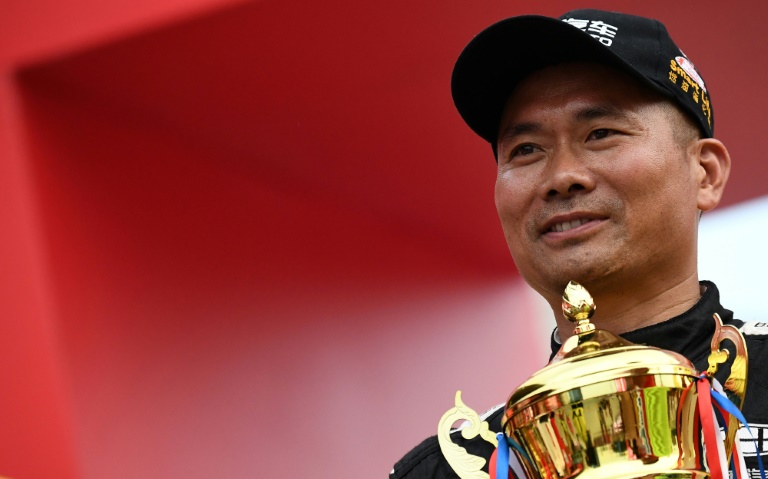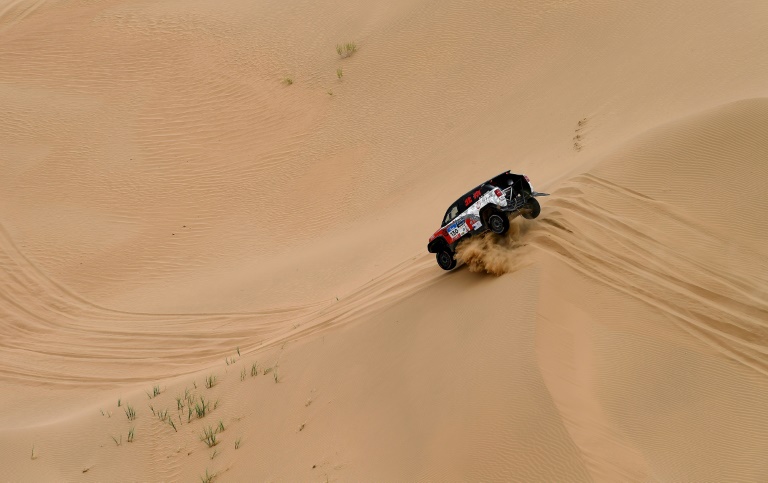Trailing enormous plumes of dust, the Silk Way rally cars tore through the Gobi Desert bound for China's Imperial city of Xi'an -- fresh evidence of the Middle Kingdom's newfound love of motorsports.
From the well-established Chinese Grand Prix to an explosion of kids’ karting events, the country which until recently relied more on the bicycle than the internal combustion engine is getting behind the wheel in a big way.
Motorsports are enjoying a boom across China, from the two-week-long Silk Way odyssey to the hundreds of local car rallies, motocross events and touring car championships that take place every year.
Just 30 years ago, such events were more or less unheard of in the fast-changing country, which now boasts the world’s second-biggest economy after the United States and a growing urban middle class with money to burn on hobbies.
“People have more and more means and free time,” said Wang Xudong, chief executive of Zhongshi Huanqiu, a Chinese company that organises motor racing in the country.
“And in parallel the Chinese car market is growing.”

Chinese driver Han Wei came third in his Chinese-made Geely car
It is hard to believe now, so clogged with traffic are cities such as Beijing and Shanghai, but cars were still rare on Chinese streets three decades ago.
With sales of 24.38 million passenger cars last year — up 15 percent in 12 months — China is now the world’s largest car market.
And since the watershed 2004 Chinese Grand Prix in Shanghai — now an annual fixture on the Formula One circuit — motorsports have been on turbocharge.
The first Formula E race — auto racing with electric cars — in history took place before 75,000 spectators at Beijing’s Bird’s Nest Olympic stadium in 2014.
– ‘Thirst’ for motorsports –

The Silk Way Rally set off on July 7 from Red Square in the heart of Moscow, travelled through Russia’s grassy steppes and the great plains and mountains of Kazakhstan before crossing the daunting Gobi
The Silk Way Rally set off on July 7 from Red Square in the heart of Moscow, travelled through Russia’s grassy steppes and the great plains and mountains of Kazakhstan before crossing the daunting Gobi.
Exhausted racers crossed the finish line on Saturday in Xi’an, some 9,599 kilometres (6,000 miles) later, with Chinese driver Han Wei coming home third in his Chinese-made Geely car.
The event — co-organised between China and Russia — has ambitions to rival the prestigious Dakar Rally.
“The Chinese have a thirst for organising their own events, like what has happened in Europe, but are a few years behind, and they have really become fans of discovery and adventure,” Hubert Auriol, former director of the Dakar Rally, told AFP.
Auriol was brought in by organisers of the China Grand Rally for his experience and expertise and was race director between 2013 and 2016.
“Perhaps we had in mind a somewhat stereotyped image of the hard-working Chinese, but it is like anywhere else in the world: at one point it is about leisure, relaxation and doing something else,” Auriol added.
Yang Yulin, a 28-year-old Chinese accountant marvelling at the rally cars pounding their way through the Gobi sand, told AFP he was a motorsports fan.
“I do karting and I love riding my 4×4 in the dunes,” he said.
– Political will –
The growing popularity of motorsport in China also owes much to the exploits behind the wheel of writer, blogger and director Han Han, 34, a trendy youth icon and 2012 national rally champion.
Crucially, the Communist authorities also appear to be fans of the sport.
In October last year the Chinese government called for “continuous improvement in the organisation of motorsports”, urging the creation of new racing circuits and encouraging the staging of rallies and other events.
“There is the political will, so behind everything, everything is easily organised,” said Auriol, who sees “enormous potential” in the country for the sport.
“China is densely populated, so people tend to imagine that there are only cities, but in the north you have gigantic regions with magnificent deserts that are totally suitable to rally-raids.”
And a new generation of Chinese drivers is coming, said Wang, the race organiser.
“Before, they started to compete in adulthood, but from now on they are trained in karting (at a young age) and the future is promising,” he said.
That was echoed by the rally driver Han Wei: “Bit by bit, you’ll see, we’re getting closer to the international level.”






